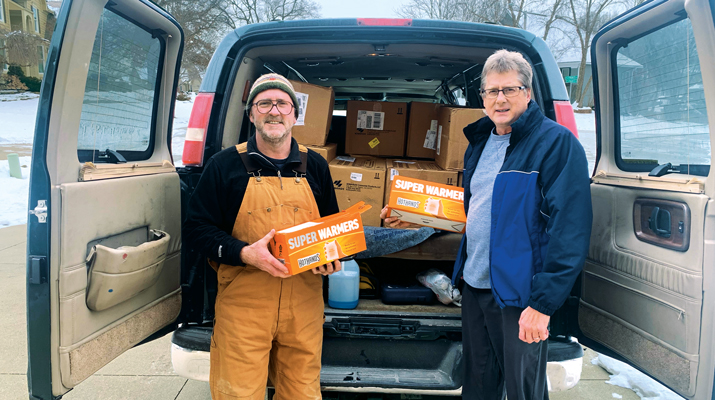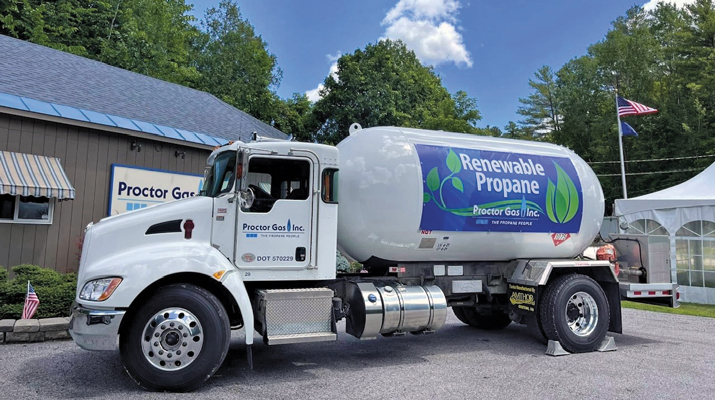Cylinder theft keeps propane retailers searching for solutions
The Lakes Gas Co. plant, situated in the center of Minneapolis, isn’t located in the safest of the city’s neighborhoods. Thieves recently robbed catalytic converters from vehicles up the street, and plant manager Joe Lewerenz isn’t keen on sticking around the neighborhood after dark.
“At nighttime it’s a whole other animal down here,” he says. “It’s not exactly the most high-end neighborhood.”
The Lakes Gas plant, which exchanges 20-pound cylinders, is generally safe because few criminals want to deal with the added consequences of breaking into a propane facility, Lewerenz says. But just because the plant is immune from crime does not mean Lakes Gas isn’t affected by it in this inner-city neighborhood.
Many Lakes Gas customers are independent gas station operators who offer their own customers cylinder exchange. These entrepreneurs encounter 20-pound cylinder theft on occasion. And when thieves target tanks, Lewerenz almost always hears about it.
“You probably get two or three thefts in the spring, then you’ll go half the summer with nothing,” Lewerenz says. “Then it will happen again.”
Many of the gas station operators Lakes Gas serves fully understand that stolen cylinders are their responsibility. They take ownership when cylinders are stolen, pay for the losses and cooperate with Lakes Gas to take steps to improve the storage cabinet’s security.
Other gas station operators say they understand their responsibility upon cementing a relationship with a retailer, Lewerenz says. But they put blame on the retailer when cylinders are stolen.
“They say it’s your cage,” Lewerenz says. “It’s not really our cage because we lease it to them. It’s like you’re leasing a car – if anything happens to it, you have to replace it and fix it. That’s kind of how we work with our leasing program. But that’s also where a fight can come in.”
To avoid such encounters – and, more importantly, to deter criminals from stealing cylinders from its customers – Lakes Gas makes serious recommendations related to locks and security measures. As Lewerenz says, no lock is thief proof, yet higher-quality locks that require more than a few minutes to break are more likely to force thieves to look elsewhere.
“You’ve got to slow them down in getting into the cabinet, or else they’ll hit it every time,” he says.
Being proactive
Two measures Lakes Gas has taken over the years to secure its customers’ property are to provide stronger cabinets and higher-tech locks, as necessary.
“Before, we used to let the owners buy their own locks,” Lewerenz says. “But sometimes they just buy the cheapest one out there, and they’re the easiest ones to break into. We buy locks that are pretty theft deterrent to make it tougher.”
According to Lewerenz, thieves tend to case gas stations to determine whose cabinets have low-quality locks. If thieves happen to find cabinets with dollar store-quality locks, which Lewerenz has seen in use many times, then gas station operators are inviting thieves to break in.
“If it takes them more than five minutes to get into the cabinet, your window of being seen is [greater] than them just putting them into a pickup [truck],” he says. “I’ve even talked to some police officers who say do what you can to slow them down. They want easy money. They don’t want to be seen.”
Another deterrent for cylinder thieves is probably the most obvious one: security cameras. Not all gas station operators protect their businesses with cameras, though, providing thieves another opportunity to escape unseen.
“If [gas stations] have surveillance, they’re not going to get hit if they have a security camera [pointed] on the cabinet,” Lewerenz says.
But even gas station operators with surveillance have been victimized because they don’t position security cameras properly, he says. Many operators prefer to position cabinets in a tucked-away part of the store’s perimeter so the storefront is not cluttered. This formula is yet another recipe for trouble, according to Lewerenz.
“When we place a cabinet, we try to tell them not to place it in a dark corner,” he says. “Twenty-four-hour gas stations probably never have a problem. It’s mom-and-pop [gas stations] that shut down and get hit at 2 in the morning. The bad guys kind of know that. They look to see for vulnerability.
“We try to educate the customer, but they own the business and put [the cabinet] where they want it.”
Lewerenz recalls one specific gas station operator who didn’t want his storefront cluttered yet listened to Lakes Gas’ advice and positioned his storage cabinet where a surveillance camera could see it. The operator captured footage of a thief breaking into the cabinet, and the evidence was used to help police with its investigation.
“I don’t know if they prosecuted the person, but he was able to get it on camera,” Lewerenz says. “That helps with everything, because if the [cylinders] are stolen and they ask if you have video of it and you don’t, there’s not much they can do.”
Lewerenz also recommends victims file a police report when cylinders are stolen. Although this step seems like an obvious one to take, several Lakes Gas customers who have been victimized did not file reports afterward. This lack of action minimizes the chance thieves are ever caught and cylinders are recovered.
“The first question I have for them when they call and ask for replacement cylinders or a replacement cage is did they file a police report,” Lewerenz says. “Some guys don’t even file reports. The police do what they can, but the sad part of it is it’s a very minor dollar theft compared to most of what they do. They don’t have the time to spend on these smaller cases.”
New deterrents
According to John Hawkins, CEO of cylinder storage cabinet manufacturer H&H Sales Co., the most common tool he’s heard thieves use to break into cabinets is a Sawzall reciprocating saw. Thieves use the portable saws to cut into locks and even cabinet handles.
H&H Sales at one time redesigned its handles for added strength, and Hawkins says the company moved from a hex head bolt to a rounded head bolt so thieves can’t access cylinders by removing doors. H&H Sales also offers multiple locks to meet different customer needs.
“We have a regular lock, and if [customers] tell us they need something more substantial then we have another source with padlocks, with a little more resistance of cutting through the shackle to prevent theft,” Hawkins says. “If they want these things, they’re going to have to go through the lock system or the expanded metal to remove the tanks.”
Hawkins also says he’s familiar with an incident in which multiple thieves attempted to slide entire cabinets into truck beds, although most incidents customers reported to him involve thieves simply cutting locks and taking tanks.
“They may handle [a cabinet] by using two-wheel dollies, picking up the front end and taking a truck with a liftgate on it and slipping it in to the back of the truck,” he says.
Lock America’s Rich Morahan says industrial sites are potential targets, as well.
“If you have 30 [cylinders] to power the tow motors in your factory or warehouse, you ought to be locking them up with a door where everyone and his uncle doesn’t have a key,” he says. “I’ve been in warehouses where a guy leaves it unlocked. Guys are going to go in there at 6 in the morning and take a tank.”
Impact on retailers
Propane retailers are forced to buy new cylinders when the ones in their rotation are stolen. New cylinders are typically about $25, Lewerenz says, and those expenses add up fast if thieves nab multiple tanks at a time.
“It doesn’t take very long to lose quite a bit of money over a period of time,” he says. “It’s a loss for us. If you can’t get the customer to recoup that price, you have to buy them. It’s an all-out loss for us, and we have to absorb it somehow into our business.”
Generally, Lewerenz says, Lakes Gas hopes to keep each 20-pounder in rotation for 12 years or longer. That doesn’t always happen, of course. When tanks are stolen from gas station operators, for example, Lakes Gas reminds them that they expect to be paid for the losses.
“Some understand,” Lewerenz says. “When we have a new customer, I try to emphasize to them that they’re responsible for the cylinders in their cabinet. But that’s only as good as their word. Some don’t want to pay for it. They try to pass the buck down.”
The most challenging part of collecting in this scenario is that gas station operators are still customers.
“The hard part of being the wholesaler is you can only play hardball with them so much,” Lewerenz says. “They’ll say they’ll leave you. You can charge that money, but it doesn’t mean you’re going to get it.”
In some cases, if gas station operators had multiple cylinders stolen, Lakes Gas will attempt to compromise.
“If they had 12 cylinders, there have been cases where if you pay for eight I’ll pay for the other four,” Lewerenz says. “But we take steps after that, like new locks, a better, stronger cage. At that point in time, that’s when we stress upon them to improve their locks and where their cage is set.”
SIDEBAR: Why propane cylinders?
Pulling off a theft is a challenge unto itself, but what are thieves doing with propane cylinders once they’re theirs? Lock America’s Rich Morahan says thieves are doing one of two things.
“They steal to resell and to use in methane amphetamine production,” he says. “You empty the tanks and fill them up with something else.”
Lake Gas’ Joe Lewerenz leans toward Morahan’s first theory: that thieves target cylinders because they’re trying to make a quick buck with a direct sale on the street. Lewerenz says scrapyards are also potential customers for thieves, although the scrapyards in his area don’t accept cylinders because of potential hazards.
“It used to be that thieves were stealing for cooking their product,” he says. “Now I think it’s back to the gas part of it. If they steal 10 cylinders and sell them for $10 apiece, they get $100. It’s easy money.”
Morahan agrees with Lewerenz’s sentiment.
“It seems two guys sit down at a bar and say why don’t we steal some tanks from down the street,” he says. “[They’ve] got a few guys who will buy them.”
Is your company faced with a security problem or you have found a solution along the way? Tell us about it. Email LP Gas Managing Editor Kevin Yanik at kyanik@northcoastmedia.net.
Photo: LP Gas

















Very interesting article, had not given much thought to security cameras or high quality locks for propane exchange cabinets, also did not think about a whole exchange cabinet being stolen, will make security higher priority
Like this article
There are far better ways to stop exchange tank theft than just locking the cabinet door. Lock the outlet valve! this makes the tank worthless to a thief since the lock can not be removed and therefore a thief can’t use the gas. putting the outlet lock on an empty tanks also makes the tank useless to meth labs. Google propane locks and see what’s out there. the locks can be removed from a full tank when exchanged for the empty. The PoLock should be put onto the empty tank so that it can’t be stolen & used by meth labs.